blog article
Campus Spotlight: Coder Camps Phoenix
![]()
Written By Imogen Crispe
![]()
Written By Imogen Crispe
Course Report strives to create the most trust-worthy content about coding bootcamps. Read more about Course Report’s Editorial Policy and How We Make Money.
Course Report strives to create the most trust-worthy content about coding bootcamps. Read more about Course Report’s Editorial Policy and How We Make Money.
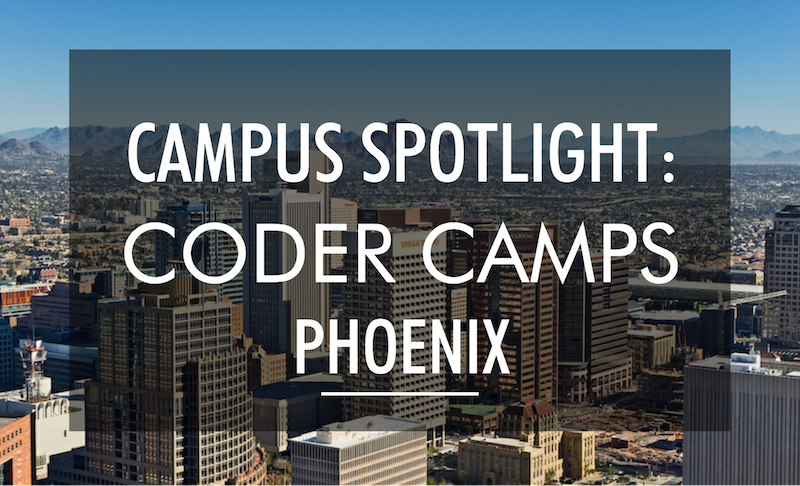
Why is Phoenix, Arizona a good place to learn to code? Coder Camps just opened a new coding bootcamp campus in Phoenix hoping to help fill the demand for tech talent. It’s their third campus after Seattle and Houston, all teaching .NET and full stack JavaScript. We spoke to Coder Camps Director of Education John Thomas about what the Phoenix campus is like, what students will learn there, and what sort of companies are hiring. Plus, find out about the large variety of tech meetups going on in Phoenix!
When did the campus open and how’s it going so far?
We officially opened on November 21st. It’s really great, we’ve got students enrolled in the courses and having a good time.
What’s your background and how did you get involved with the bootcamp? What drew you to want to work with Coder Camps?
I’ve been in IT for about 20 years. I’ve worked for companies like AT&T, Apple, and HP. More recently I was the lead software developer at Godaddy.com. After that I joined a local marketing company and became the CTO there. Then I got a job with AAA, the automobile company. I contracted there for a while, and when that ended I was trying to figure out what my next move would be. I really enjoyed the coaching and mentoring part of being a manager. I had lunch with a friend and I was telling her that my ideal job is teaching people what I know. I’ve been doing this so long, and I’m at a point where I want to pass on my knowledge. I didn’t think a job existed that would do this. Then a recruiter reached out to me and told me about this Coder Camps role, and asked if I was interested.
Did you move to Phoenix for this role?
No, I moved to Phoenix for a previous role. I’ve worked in Silicon Valley, Sacramento, and Portland, Oregon.
What’s your role at Coder Camps?
I’m the Director of Education. I’m in charge of the teachers, the TAs, and the curriculum, for all campuses. All of our curriculum is identical for each campus. Depending on the industry we may change specific details of the curriculum.
What is the Coder Camps Phoenix campus like?
We have a couple of classrooms. We have a room which is really big, and broken up into different parts. When students do their group projects, they have whiteboards and tables in an open work environment so they can collaborate, work together, and get the feeling of working in an office environment. So many IT companies have an open floor plan, with lower cubicles or just tables people are sitting at. So our layout is designed to help them get adjusted to that sort of environment early on. We might be working, and someone might be playing ping pong down the hall.
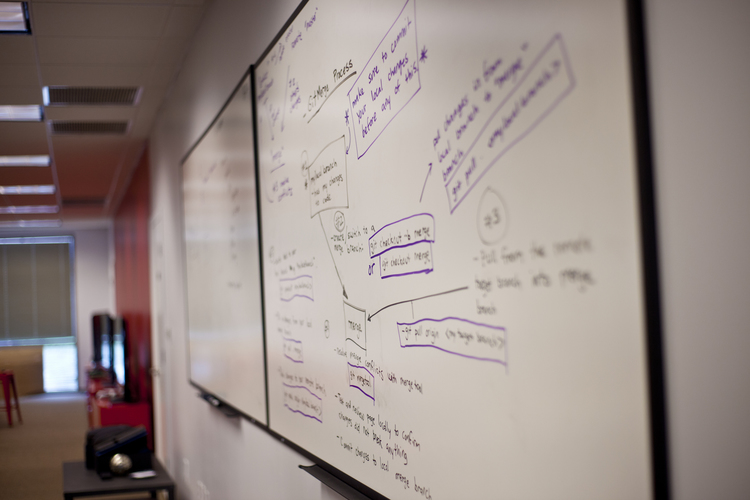
We have a really nice facility. Of all the bootcamps I’ve been to, this is by far the nicest. We have some great tables and setups, we’ve got a pool table, and Xbox. We have a common room where students hang out at lunch and talk to each other. Even after hours students are in there talking. We have all the amenities an office would have.
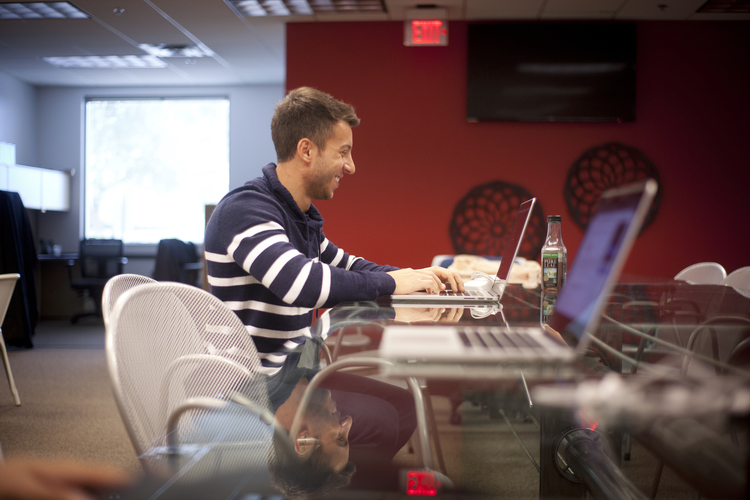
What neighborhood is it in?
It’s in Scottsdale. It’s northeast Phoenix, and it’s a very nice neighborhood. You can safely walk around near the campus.
How many students can you accommodate? How many students do have in a cohort?
Currently we have 24 students, but we can accommodate 60 students, and we are expanding.
We stagger the cohorts. We offer a .NET and a JavaScript class, and every three weeks we start a new class. We do have some overlapping start times, so we have one that runs 12 weeks and then the next one runs 12 weeks. Right now we already have a .NET class and a JavaScript class running.
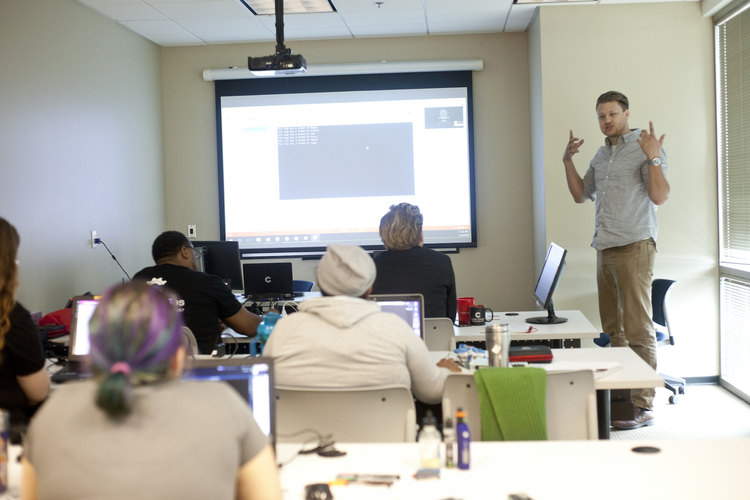
What tracks or languages are you teaching at the campus? Why did you choose those and are they particularly popular or relevant in the city?
All campuses teach .NET and full stack JavaScript. We are going to be adding to that over the next few months to include other technologies. One thing that we’ve noticed is a lot of bootcamps go for the sexiest or latest greatest technologies. But we do the latest greatest of the steadfast technologies.
Another thing we noticed is if you go on any job boards and type in .NET there are thousands of open jobs. If you go in and type Golang there may be one or two. If you type in Ruby on Rails, there are several, but nowhere near what .NET has. And every company wants Javascript. So .NET is huge, we will be including Java eventually. Between those two languages you’re always going to have a job. In the industry we’ve always joked that if you never want to go hungry, learn .NET or Java.
Java and .NET are the two primary technologies across states. In Silicon valley you’ll get a lot more newer tech like Golang or Ruby on Rails, in the startup culture. That’s true in many cities, because startups favor the open source technologies, but if you look at enterprise companies they are all using either .NET or Java.
What kind of differences or changes did you need to make to the curriculum to accommodate the Phoenix market?
That’s one of the interesting things about Phoenix, we have a really diverse ecosystem for tech. We’re becoming this giant tech mecca now. We didn’t really have to change the curriculum, because everyone here wants Angular, C# .NET, or full stack JavaScript, all of which we already teach.
How many instructors and/or mentors do you have in Phoenix?
Currently we have five instructors. All of our campuses are structured the same, so that if you go to any one of them you’ll get the same experience. So we started off with five in Phoenix. Obviously, if a campus expands and we get more students, we’ll bring on more people. We have a full-time JavaScript instructor, and a full-time .NET instructor, then a mentor in each class. We also have a senior mentor who knows both tracks, and floats between the classes as needed.
What kind of hours do students put in?
The class day is eight hours a day, but there is homework and projects students have to work on. A lot of times students will stay here late, and put in more hours. Then there are other days when students may not have so much to do. Occasionally students come in on Saturdays as well. It’s very immersive, very deep, and very much simulates what an office would be like.
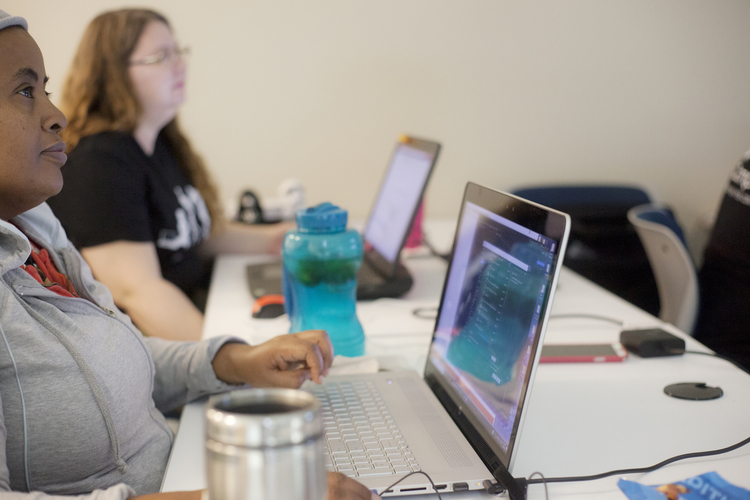
How is the Phoenix campus similar or different to the other Coder Camps campuses in Seattle and Houston?
We’re similar in structure. The course content curriculum is identical, we all teach from the same material. We’ve lined them up now so all C#, .Net and the JavaScript classes start on the same day. Something we are going to integrate in the next month or two is the ability to let instructors from other campuses teach remotely. If an instructor in Phoenix gets sick and can’t teach that specific class, we might be able to get a remote teacher from Seattle or Houston. We want to keep things agile and moving around, in a sense that students can have other experiences as well.
Part of our philosophy is that all of them are the same, I don’t want a student in Houston to say “I didn’t get the same experience as a student in Phoenix.” All of them have the same amount of classrooms, the same number of instructors, the same curriculum, and we want to foster that idea as we go forward, that everyone has the same experience.
Why is Phoenix a great place for a coding bootcamp?
Phoenix is one of the big tech communities in the nation right now. We have electric cars being built here, and a lot of Silicon Valley-based companies starting to build here in Phoenix. We have better tax rates here, so a lot of companies have an incentive for moving here instead of being in California. I think Phoenix has a 2% unemployment rate for developers. There are more developer jobs than there are developers to fill them.
There are a couple of other coding bootcamps in Phoenix. What will make your bootcamp stand out amongst the competition?
There are a few things. I’ve hired people from other bootcamps, and they understand the technology and the basics of programming, but not how to put it all together. Our core philosophy is to teach you the fundamentals – how something works through the technology. If you know JavaScript, it’s a lot easier to then learn Angular and understand what it’s doing under the covers. So we teach the core fundamentals of programming. It might sound really cliche, but we teach problem solving through programming, to really problem solve, instead of just following a recipe.
Part of our program includes a six-week group project. There is project management, where each student takes a role, and they have to be able to explain the project at the end. Those are pretty complicated projects with everything from authentication to file uploads. So students who have really great projects when they graduate, can show them off to companies as they apply for jobs. Programmers at their core solve problems and that’s the hardest thing to teach. How do you teach someone to solve a problem, and then use a tool? If I know how to drill a hole, or hammer a nail, it doesn’t matter what brand of hammer or drill, I will know how to use it. We teach students how to drill a hole, regardless of the technology.
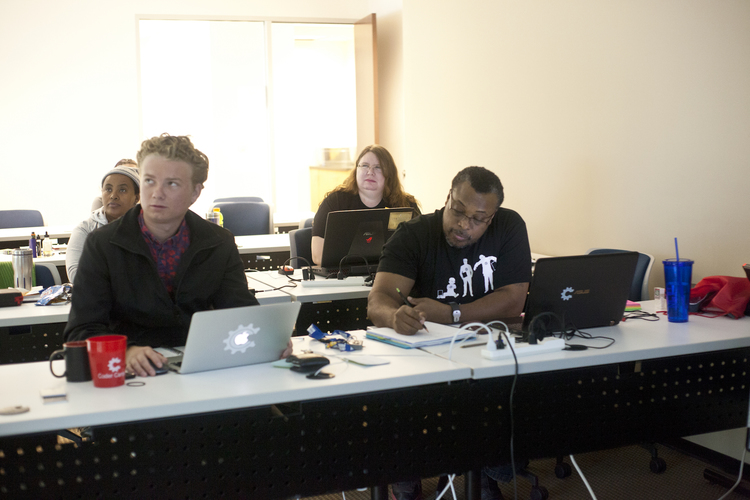
We also have a Coder for Life program, which allows you to take any of our other courses after you’ve taken one course. If you go through the JavaScript course and in a year you realize you really need to do .NET, you can go through .NET course. I haven’t seen that with other bootcamps. You can do that at any campus. Maybe you went to Coder Camps in Phoenix, but now you live in Seattle and want to go back and learn something new– you can go to the Redmond campus and take it there. As we bring out more courses, our grads can continue doing that for the rest of their lives. We’re here to support them throughout their career.
What sort of jobs are you expecting graduates to get in Phoenix?
We’re starting to work with some companies here. In our other cities students have been hired at Fortune 500 companies, universities, hospitals, and in pretty much every industry that is hiring developers. We’re going to continue that here. There are a lot of job openings here, and we help with placement. We have recruiters on staff who actually work with companies to get our students hired. We have a lot of big companies here who are always looking for people.
What sort of companies are hiring in Phoenix?
Every major insurance agency is here in the valley, and all of them are hiring. They look at recent grads, mid-level, junior, and senior. We have Tuft & Needle, an online mattress company here. Plus a lot of e-commerce companies that hire junior developers.
Since the job market is so customer service-based in Phoenix, would students be applying for jobs in support engineer-type roles?
Godaddy has three call service agent centers here, and tiers of that. Some of those centers are hosting support, some of them are WordPress support – jobs where programming skills will definitely be useful, yes.
Do you have hiring partners in Phoenix?
We’re working on that now. The plan is if we partner with a Fortune 500 company, and we say, “what do you specifically want our candidates to have,” we can try to work out a customized program. We can put students through a specific curriculum to address the needs of that specific company, and they can then go straight into a junior role at that company.
Will it mainly be junior developer roles that your grads will be applying for, or are there other roles they would be qualified for?
Right now we’re focusing on the junior developer type role. It’s really hard to get into mid- or senior-level roles after a bootcamp. There are other roles for different tiers of technical support, and roles within marketing organizations, which use a lot of programmers. You may go in and not be considered a junior developer, but a developer.
We are looking at expanding our curriculum to cover other industries as well. Programming is our primary. There are definitely opportunities for things like DevOps and so on. A lot of companies have taken on continuous integration and have a DevOps-type feel. They hire devs to code those tools out, and the deployment process becomes a lot easier.
What Phoenix meetups would you recommend for a complete beginner who wants to learn about Coder Camps or coding in general?
If you’re interested you can come check out our campus Monday through Friday 8am to 5pm. We have campus advisors who can help prospective students out, give us a call, or check out our website.
One thing about Phoenix that’s great is we have a huge meetup environment– we’re very social. One meetup that started in July is called Tech Neophytes, which helps connect entry level technical professionals with experts here in Phoenix. We have Phoenix Javascript, which is over 1,700 members strong, it’s huge. The guy who runs that, Brad Westfall, is also in charge of doing CSS Day here in Phoenix. We have Girl Develop It Phoenix which is 1,100 strong, and focuses on women in tech. There is the Arizona Software Community, that’s about 1,400 strong. We have ones for big data, iOS, Ng-Phx is for Angular, and we have a React group which is great. All of them are very social. Another great one is HackerNest Phoenix, which hosts tech social events which we go to quite frequently. I believe we are going to be starting our own meetup here pretty soon.
Read a Coder Camps review and be sure to check out the Coder Camps website!

Imogen Crispe, Content Creator and Entrepreneur
Imogen is a writer and content producer who loves exploring technology and education in her work. Her strong background in journalism, writing for newspapers and news websites, makes her a contributor with professionalism and integrity.
Sign up for our newsletter and receive our free guide to paying for a bootcamp.
Just tell us who you are and what you’re searching for, we’ll handle the rest.
Match Me